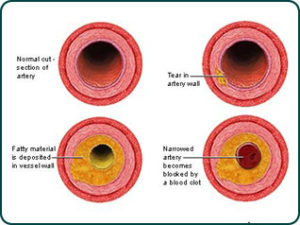High Cholesterol
Cholesterol is a fat-like-waxy substance that your body needs.. But when you have too much in your blood, it can build up on the walls of your arteries. Overtime, this build- ups cause the arteries to harden and narrow, slowing down blood flow to the heart and may form blockages. This can lead to heart disease, heart attack, and stroke.
There are good and bad cholesterol. The “good” one is called high-density lipoprotein (HDL) which helps prevent cholesterol from building up in the arteries. The “bad” one is called low-density lipoprotein (LDL) and it is the main source of cholesterol build up and blockage.
 (CDC, 2013).
(CDC, 2013).
Symptoms of High Blood cholesterol are usually unremarkable and so many people are not aware that their cholesterol level is too high. Therefore, see your doctor for a simple blood test to check if your cholesterol is high.
When you hear about high cholesterol, it is about “bad” LDL cholesterol. The goal is to increase the “good” cholesterol and decrease the bad one.
According to CDC, Seventy-one million American adults have high cholesterol, but only one-third of them have the condition under control.
Factors that could affect your cholesterol level that you may not have control of include:
1. Heredity – High blood cholesterol sometimes runs in the family. So your gene may determine how much cholesterol your body makes.
2. Age and Gender: As you age, your cholesterol level tends to rise; Women’s LDL tends to rise
during or after menopause and men are affected too as they age.
Prevention / Control of High Cholesterol: You have control over making lifestyle changes such as:
• Eating a healthy diet. Avoid saturated fats and trans fats, which tend to raise cholesterol levels. Other types of fats, such as polyunsaturated fats, can actually lower blood cholesterol levels. Eating fiber also can help lower cholesterol.
• Exercising regularly. Physical activity can help lower cholesterol. The Surgeon General recommends that adults engage in moderate-intensity exercise for at least 30 minutes 3-4 times every week.
• Maintaining a healthy weight. Being overweight or obese can raise your cholesterol levels. Losing weight can help lower your cholesterol.
• Not smoking. If you smoke, quit as soon as possible.
Useful Link: CDC. Vital signs: prevalence, treatment, and control of high levels of low-density lipoprotein cholesterol—United States, 1999–2002 and 2005–2008. MMWR. 2011;60(4):109–
14. The American Heart Association. How to Get Your Cholesterol Tested Website.


